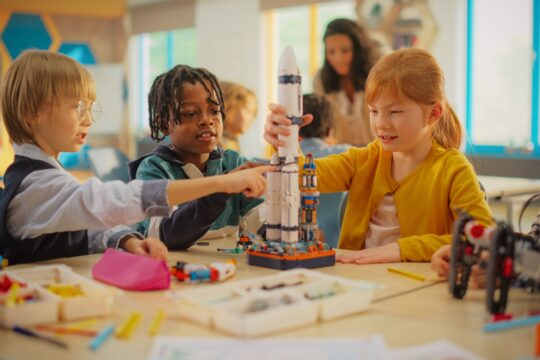Do you have a chatty class that loves to talk? Instead of disciplining them for talking about irrelevant things, you can give them something to talk about. Peer-led discussion groups offer students a dynamic space to engage in meaningful conversations with their classmates.
The power of peer-led discussion in literature circles helps students develop critical thinking skills as well as shape students into insightful, collaborative learners. Here we’ll discuss what literature circles are, why peer-led discussions are important, the benefits, and how you can create engaging and impactful peer-led literature circles in your classroom.
What are Literature Circles?
Literature circles are small groups of students who read and discuss the same book or a shared text. Similar to a book club, they allow students to share their thoughts, ask questions, and explore different perspectives.
The main difference between a book club and a literature circle is that they are student-centered and peer-led. Each group member within a group takes on a specific role guiding the discussion. The students drive the conversation while the teacher guides the students (using prompts or discussion cards).
Why Peer-Led Discussions Matter
In a traditional classroom, the teacher leads the discussion by asking questions and offering insight. In a peer-led discussion, the students take charge and are encouraged to articulate their thoughts. These groups give students a sense of accountability and push them to read and contribute to their group.
Knowing they must share their thoughts and opinions, students read and may even reflect on what they’ve read, which can result in a deeper understanding of the text. Student-led discussions create a space for students to feel safe sharing their thoughts with their peers without the fear of judgment from their teacher. This can lead to a more open and honest discussion that they may not have had if it was teacher-led.
The Benefits of Literature Circles
The benefits of student-led literature circles offer many advantages. Here are a few.
Fosters a Love for Reading
One of the many benefits of literature circles is that it ignites a passion for reading. Since students typically get a choice of what they want to read they select books that are of interest to them. By doing so, it makes the reading experience more enjoyable than if they were just given a book. Discussing the book with their classmates can also make reading a more enriching experience.
Improves Communication Skills
A valuable skill students learn during peer-led literature circles is how to communicate well with others. Literature circles allow students to express their thoughts and actively listen to others. Students practice expressing their thoughts in peer-led discussions. They must support their views with text evidence and consider different perspectives.
Encourages Collaboration
Literature circles require students to work together to make meaning of what they are reading. Often, students will build on each other’s ideas, challenge each other, and ask questions that help them understand more deeply. This team-focused atmosphere teaches students to value everyone’s input and to respect differing opinions.
Builds Critical Thinking Skills
In literature circles, students actively participate in the learning process. To be part of the group, students must analyze what they read, formulate questions, and make connections between what they’ve read and the real world. All of this requires higher-order thinking. As students gain experience, their ability to think critically about what they read improves. This helps them in literature and all subjects.
How to Set Up Successful Peer-Led Literature Circles
To maximize peer-led discussions in literature circles, students must feel confident and supported. Here are some helpful tips to make them successful.
Choose Thought-Provoking Texts
The key to a successful literature circle starts with choosing the right engaging, and thought-provoking text. Consider giving students a few options to choose from, this will help to increase engagement. The more excited they are about reading the book, the more likely they will be interested in discussing it.
Establish Roles and Responsibilities
To help guide discussions assign specific roles and responsibilities within each group. Roles such as discussion director, connector, summarizer, and questioner provide structure within each group. To ensure all students have the opportunity to take on a different position, be sure to rotate roles. Also, consider passing out discussion cards. Discussion cards will help get the conversation rolling.
Model Discussion Techniques
Spend time modeling effective discussion techniques such as active listening, asking open-ended questions, and responding thoughtfully to others’ ideas. Again, using discussion cards will help those students who need support to express their thoughts and opinions more easily.
Create a Respectful Environment
For literature circles to be effective students must feel safe to share their thoughts and opinions. They must also feel their opinions are valued. That’s why it’s important to reinforce the importance of listening to others and valuing diverse perspectives. Consider brainstorming some “chat rules” with students. Here are a few you may want to add to your list.
- Use a clear voice when speaking to the group
- Listen carefully as each person takes their turn talking
- Wait patiently until the other person is done talking before you take your turn
- Ask questions if you do not understand what someone is saying
- Always use kind words when speaking and be prepared to support your opinion
The impact of peer-led discussions in literature circles is undeniable. By carefully and thoughtfully crafting literature circles, you can create an environment where students take ownership of their learning, engage in deep conversations with their peers, and develop essential skills like critical thinking and communicating and collaborating with others. By using this approach in your classroom, students can explore literature more meaningfully while also fostering a sense of community through their peer-led discussions.
Educators never stop learning; check out our available graduate degree programs to hone your skills and promote lifelong learning and academic excellence.




